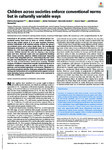Children across societies enforce conventional norms but in culturally variable ways
| dc.contributor.author | Kanngiesser, P | |
| dc.contributor.author | Schäfer, M | |
| dc.contributor.author | Herrmann, E | |
| dc.contributor.author | Zeidler, H | |
| dc.contributor.author | Haun, D | |
| dc.contributor.author | Tomasello, M | |
| dc.date.accessioned | 2022-01-17T14:02:21Z | |
| dc.date.issued | 2022-01-04 | |
| dc.identifier.issn | 0027-8424 | |
| dc.identifier.issn | 1091-6490 | |
| dc.identifier.other | e2112521118 | |
| dc.identifier.uri | http://hdl.handle.net/10026.1/18568 | |
| dc.description.abstract |
<jats:p>Individuals in all societies conform to their cultural group’s conventional norms, from how to dress on certain occasions to how to play certain games. It is an open question, however, whether individuals in all societies actively enforce the group’s conventional norms when others break them. We investigated third-party enforcement of conventional norms in 5- to 8-y-old children (<jats:italic>n</jats:italic> = 376) from eight diverse small-scale and large-scale societies. Children learned the rules for playing a new sorting game and then, observed a peer who was apparently breaking them. Across societies, observer children intervened frequently to correct their misguided peer (i.e., more frequently than when the peer was following the rules). However, both the magnitude and the style of interventions varied across societies. Detailed analyses of children’s interactions revealed societal differences in children’s verbal protest styles as well as in their use of actions, gestures, and nonverbal expressions to intervene. Observers’ interventions predicted whether their peer adopted the observer’s sorting rule. Enforcement of conventional norms appears to be an early emerging human universal that comes to be expressed in culturally variable ways.</jats:p> | |
| dc.format.extent | e2112521118- | |
| dc.format.medium | ||
| dc.language | en | |
| dc.language.iso | en | |
| dc.publisher | Proceedings of the National Academy of Sciences | |
| dc.subject | norms | |
| dc.subject | conventions | |
| dc.subject | sanctions | |
| dc.subject | coordination | |
| dc.subject | cross cultural | |
| dc.title | Children across societies enforce conventional norms but in culturally variable ways | |
| dc.type | journal-article | |
| dc.type | Clinical Trial | |
| dc.type | Journal Article | |
| dc.type | Research Support, Non-U.S. Gov't | |
| plymouth.author-url | https://www.webofscience.com/api/gateway?GWVersion=2&SrcApp=PARTNER_APP&SrcAuth=LinksAMR&KeyUT=WOS:000748066000007&DestLinkType=FullRecord&DestApp=ALL_WOS&UsrCustomerID=11bb513d99f797142bcfeffcc58ea008 | |
| plymouth.issue | 1 | |
| plymouth.volume | 119 | |
| plymouth.publication-status | Published | |
| plymouth.journal | Proceedings of the National Academy of Sciences | |
| dc.identifier.doi | 10.1073/pnas.2112521118 | |
| plymouth.organisational-group | /Plymouth | |
| plymouth.organisational-group | /Plymouth/Faculty of Health | |
| plymouth.organisational-group | /Plymouth/Faculty of Health/School of Psychology | |
| plymouth.organisational-group | /Plymouth/REF 2021 Researchers by UoA | |
| plymouth.organisational-group | /Plymouth/REF 2021 Researchers by UoA/UoA04 Psychology, Psychiatry and Neuroscience | |
| plymouth.organisational-group | /Plymouth/REF 2021 Researchers by UoA/UoA04 Psychology, Psychiatry and Neuroscience/UoA04 Psychology, Psychiatry and Neuroscience MANUAL | |
| plymouth.organisational-group | /Plymouth/REF 2021 Researchers by UoA/UoA04 Psychology, Psychiatry and Neuroscience/UoA04 REF peer reviewers | |
| plymouth.organisational-group | /Plymouth/Users by role | |
| plymouth.organisational-group | /Plymouth/Users by role/Academics | |
| dc.publisher.place | United States | |
| dcterms.dateAccepted | 2021-11-18 | |
| dc.rights.embargodate | 2022-1-18 | |
| dc.identifier.eissn | 1091-6490 | |
| dc.rights.embargoperiod | Not known | |
| rioxxterms.versionofrecord | 10.1073/pnas.2112521118 | |
| rioxxterms.licenseref.uri | http://www.rioxx.net/licenses/all-rights-reserved | |
| rioxxterms.licenseref.startdate | 2022-01-04 | |
| rioxxterms.type | Journal Article/Review |


